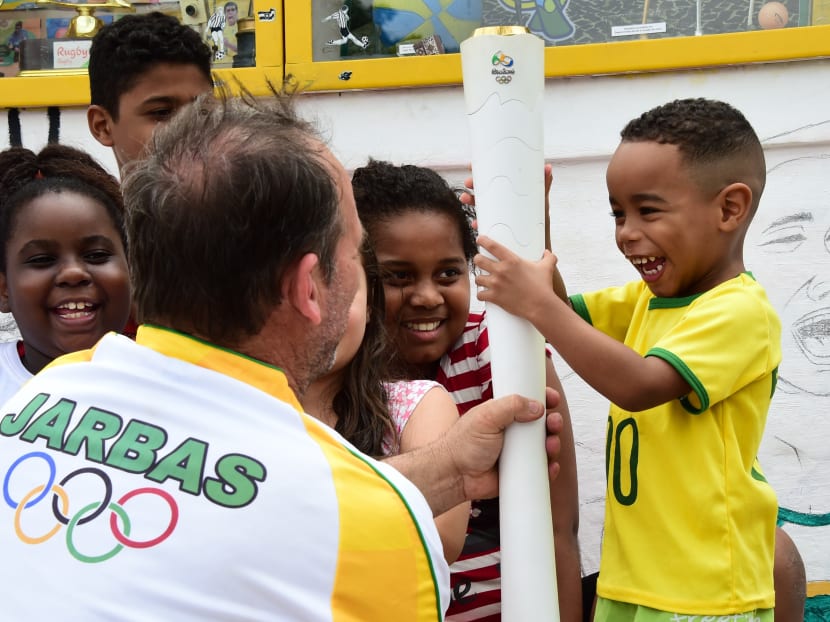Poor Brazilian kids get their own Olympics
RIO DE JANEIRO — Crowned by wreaths, faces filled with emotion, the athletes mount the podium to the strains of the Brazilian national anthem and receive their medals.

Mr Jarbas Meneghini (back to camera) hands over a replica of the Olympic torch to a young boy. Photo: AFP
RIO DE JANEIRO — Crowned by wreaths, faces filled with emotion, the athletes mount the podium to the strains of the Brazilian national anthem and receive their medals.
Yet these champions are not in one of Rio’s stadiums. They are residents of a poverty stricken suburb where one man is trying to bring the Olympic dream — if not the actual Games — a bit closer.
Mr Jarbas Meneghini, 47, once had his own dream of becoming a professional footballer. That didn’t work out and he became a mechanic, but his devotion to sport didn’t fade.
Mr Meneghini has turned his house in Campo Grande, a huge working class neighborhood west of Rio de Janeiro and 40km from the centre, into a shrine to the World Cup and the Olympic Games.
The Olympic flag as well as those of numerous countries flutter in the wind outside. The Olympic rings occupy his garage.
In a window sit a cluster of sports trophies and coloured statuettes of the Christ the Redeemer monument.
Inside, there are dozens of trophies and medals that Mr Meneghini made himself, as well as portraits of him with his footballing idols like Neymar, Pele and Romario.
Every Sunday for the past month, Mr Meneghini has brought his fantasy world to children who get no chance to share in the actual Olympic extravaganza.
They come to run on Mr Meneghini’s athletic track, which goes around his patio. They play ping pong out on the sidewalk. They run along the street parading Olympic torches that Mr Meneghini himself makes out of plastic.
The mini-Olympians get Mr Meneghini’s history lesson about the Games.
They also hear about his own walk-on role in the sporting pantheon, how despite never having become a great player himself, he managed to give handmade replicas of the World Cup trophy to more than 50 Brazilian internationals.
The programme is set to continue throughout the Olympics and Paralympics. Mr Meneghini hopes the benefits will last much longer.
“Sport has rules and this helps the kids. There are rules in professional life. There’s an hour to arrive, an hour to leave, and sport teaches you that,” the impromptu teacher said.
As soon as he knew that his home city would host South America’s first Olympics, Mr Meneghini started by making a torch replica. The children wanted more.
By the time the Games started, he was as ready as the real thing. There’s even a podium made out of old vegetable crates where children get medals and wear flower wreaths at a carefully orchestrated ceremony.
For many of the children who have never even set foot on the famous Copacabana and Ipanema beaches of southern Rio de Janeiro, going to the real Games is not a viable dream.
Parts of Rio have been transformed by Olympic projects like a newly developed port area, a tramway, a new metro line and other infrastructure.
But the poor neighborhoods known as favelas — home to almost a third of the population — and the periphery of Rio look untouched by all the billions of dollars spent.
With Brazil suffering its worst recession for almost a century, many ask why the money spent on the Olympics couldn’t have been spent instead on health services or education to narrow that gap.
“I have done the whole thing almost all by myself, but with pleasure,” Meneghini said.
“My mother helped me sew the national flags and my wife and daughter helped too. There is no government help for the poor in western districts like Campo Grande.”
“The government concentrated only on the sporting centrrs ... and forgot the poor. It’s really sad. All that remains is the people’s own strength and passionate people like me who can educate kids through sport,” he said.
And even a self-confessed sports fanatic like Mr Meneghini won’t be seeing any live events.
“The tickets are too expensive and the stadiums are too far away,” he said. AFP






